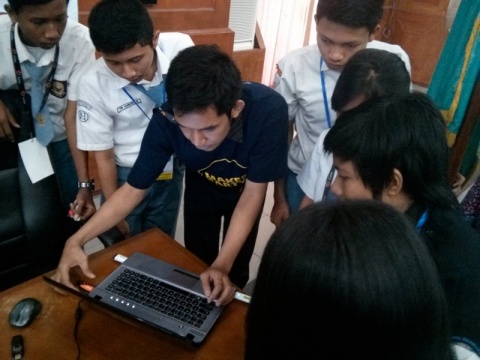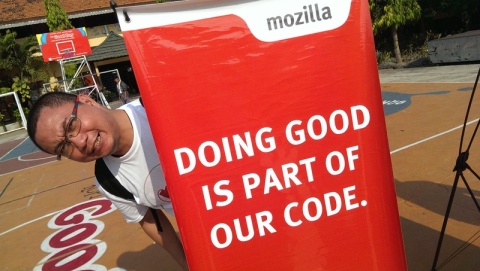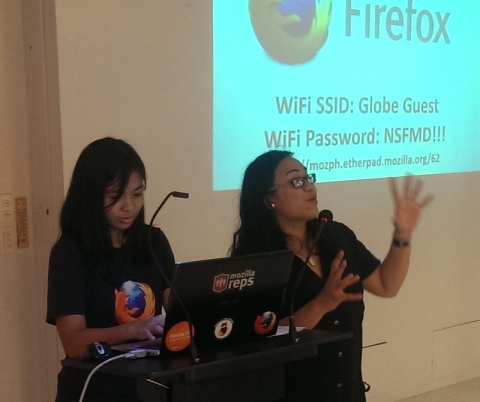People who teach others about the web are key to the future of Webmaker — and maybe even the future of Mozilla. I’m not talking only about teachers in classrooms getting their kids into HTML. Although that’s part of it. I’m talking about anyone who a) is excited about the culture and technology of the web and b) wants to help others get more out of the web they create and communicate on everyday online. We’ve been calling these people ‘mentors’. But, more simply, they are people who love the web want to share their passion.

In my recent post on Maker Party, I asked ‘how do we build a global community of mentors?’ One of the first steps is meeting these people, figuring out who they are and what they really want. We’ve been doing that all summer with Maker Party. And I did a bit personally as I traveled around over the earlier this month. Here are a few of the mentors I met:

Rafael, curious
Rafael is an IT consultant who used to be a teacher. He knows the web and a little programming. He came to our Manila Maker party just to find out what was up. He ended up winning the ‘best make’ contest with a Thimble comic strip remix. At the end he said: I want to show this to some of the teacher friends. We pointed him to webmaker.org/teach and told him local MozReps would be in touch. (Rafael is the guy with a t-shirt over his face.)

Joe, learner turned mentor
Joe is an high school student in the UK. He first got turned onto Webmaker at MozFest 2011. He liked the idea of teaching his less geeky friends about web programming, so he organized a Summer Code Party in 2012. This year he was helping as a Webmaker mentor at Campus Party in London. Joe is also active with DeCoded, an other London tech education group. (Joe is the guy in the foreground with the white mentor shirt on.)

Abdul, teacher
Abdul is an IT teacher in a high school in Surabaya, Indonesia. He helped us organize a 100 person all day Maker Party in the school auditorium. He teaches HTML and PHP using notepad already, but wants a way to get kids more excited about those technologies. The two pane Thimble editor plus having his kids hack our animated GIF postcard template seemed like a good start. Now he wants to offer Webmaker activities regularly at his school, although would find it easier if there was content in Bahasa, Indonesia.
Youth IT Clubs
In Surabaya, I met with a bunch of high school IT clubs: after-school groups led by the the IT teacher. In the case of Abdul, he recruited his club to run our 100 person Webmaker event. And wants to help them learn to be leaders and teachers themselves by involving them in ongoing Webmaker programs. We already have a great example of working with youth in this way as part of our relationship with MOUSE via Hive NYC.

Lewie, youth mentor activator
Lewie is in his early twenties. A few years ago, he didn’t know how to code. Now he teaches corporate execs about programming for Freeformers. He also helps find other young people who he can train up and do the same. This is part of Freeformers effort to get young talent creating more young talent, using a 1:1 business model where corporate training funds more training for young people from unlikely backgrounds. The Freeformers have been active users of and contributors to Webmaker. (That’s Lewie on the right.)
Michelle, partner in crime
Michelle runs developer relations for one of the two big mobile operators in the Philippines. She is also a great friend of Mozilla’s. She regularly offers event space for things like Webmaker events. And, at the Maker Party, stepped up in real time to offer a small cash prize for the best make. It’s win / win for sure: her company is positioned as part of our effort to build young web talent at little cost. But, there is more there. Michelle is personally excited about what we’re doing. This offers a great deal of validation and motivation to both the mentors and the learners in the room. (That’s Michelle on the right.)

Kindred spirits and partners, more broadly
A core idea behind Webmaker is being a big tent for anyone who wants to teach the Web. It’s about finding kindred spirits who want to teach alongside us. The three fellows above are from the local robot hacker community in Surabaya. They came to help with our Hive Pop Up. We worked with dozens and dozens of partners like this as part of Maker Party this summer including Code Club, National Writing Project, Technology Will Save Us, Young Rewired State and all of the members of our Hive Networks. I’m going to do a separate post on partners, but they are a key piece of building a mentor network in their own right.

Benny and Yoe One, Super Mentors
Benny and Yoe One are dedicated Mozilla volunteers who live in Surabaya. They don’t just work on Webmaker. But they have been incredibly active. They organized the Maker Party and Hive Pop Up in Surabaya. And, more importantly, started to build relationships with dozens of schools and local government to create interest in what we’re doing. They are ‘Super Mentors’ in our parlance: people who have the skills to teach but also want to help us bring in and train more mentors. Obviously, these people are absolutely key to the success of our Webmaker effort. (Benny is to the left and Yoe One is to the right of Abdul.)

Faye, Webmaker country lead
Faye is a university student in Manila and a Mozilla Rep. She is also the official Webmaker Country Lead. The MozReps in the Philippines have created lead positions like this for many Mozilla programs to make sure someone is a driver. Being Webmaker Lead means Faye not only organized the Maker Party I was at in Manila but is also thinking strategically about how to improve Webmaker and how to get it out of Manila into remote regions. She is like a Super Mentor with a more official role within the local reps community. We may want to consider having this kind of ‘lead’ role in other countries or other cities. (That is Faye in the Firefox shirt on the right.)

Bob, Jun and Viking, the elders
In many countries around the world, Mozilla is lucky to have a community of elders. People who have been a part of the Mozilla community since very early on. A number of these people have been critical in getting Webmaker going in their countries, encouraging other community members like Benny, Faye and Yoe One to get involved. These people also could (and should) play a key role in defining where we go next with Webmaker and how it ties into the rest of Mozilla’s work. (This is a picture of Viking. Bob and Jun are on the right in the picture below.)

The posse
Finally, a key part of the picture is what I just call ‘the posse’. These aren’t mentors per say, although they do often pitch in teaching at Maker Parties. They are active Mozilla community members working on a variety of things who are willing to help their peers who are running Webmaker activities. I found them in all three cities I visited. (This is the awesome posse holding fort at the registration desk at our recent Manila Maker Party.)
—
As you can see just from my handful of examples, these mentors (sic) are quite diverse. But they do have things in common. They are passionate about the web. They want to teach or share what they know about the web in an active way. They want to be part of what Mozilla’s doing, either on the face of it or because the big tent brings people to their own teaching programs. And, across the board, they are simply generous and enthusiastic people who want to make the world better for the people around them by sharing the web.
At this stage, these mentors are the most critical audience for Webmaker. This is in part because they are the ones who get it and like it: they are in a great position to help us test, iterate and build it out further with community contributions. But it’s also because they will bring in the next round of web makers. Each mentor who uses Webmaker.org will bring 5 – 50 more users as a part of the teaching they are doing. Summed up: growing our mentor community will both make Webmaker better and grow our user base. IMHO, we should be putting most of our efforts right now on making Webmaker better for — and with — mentors.
— Mark Surman, Executive Director, Mozilla

